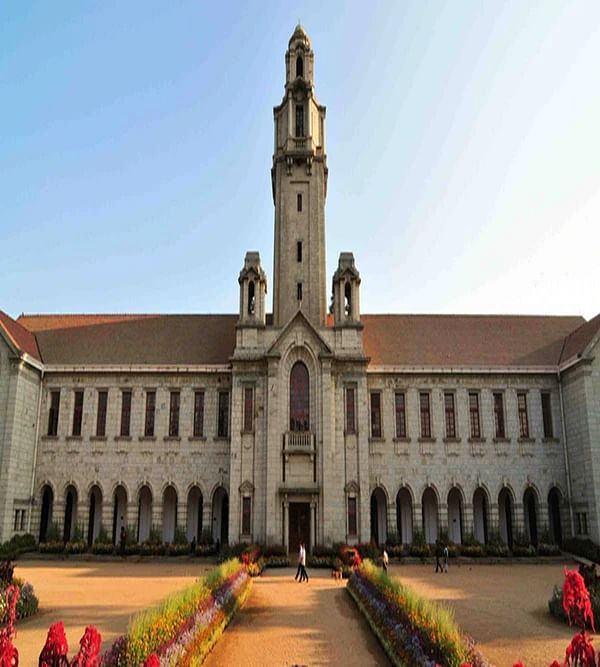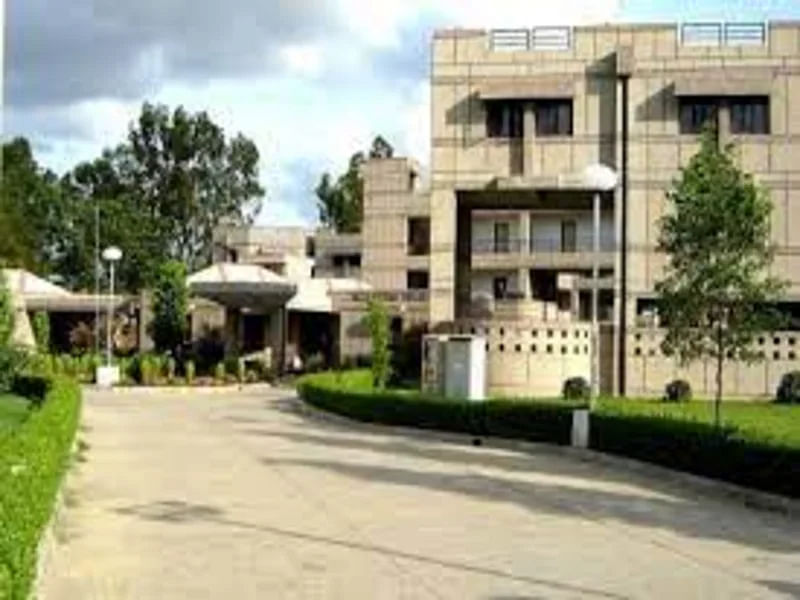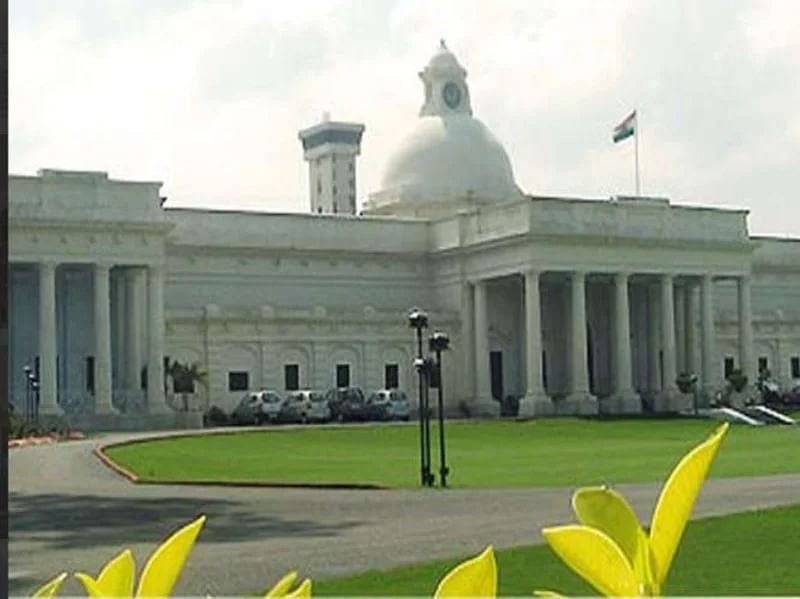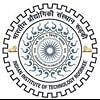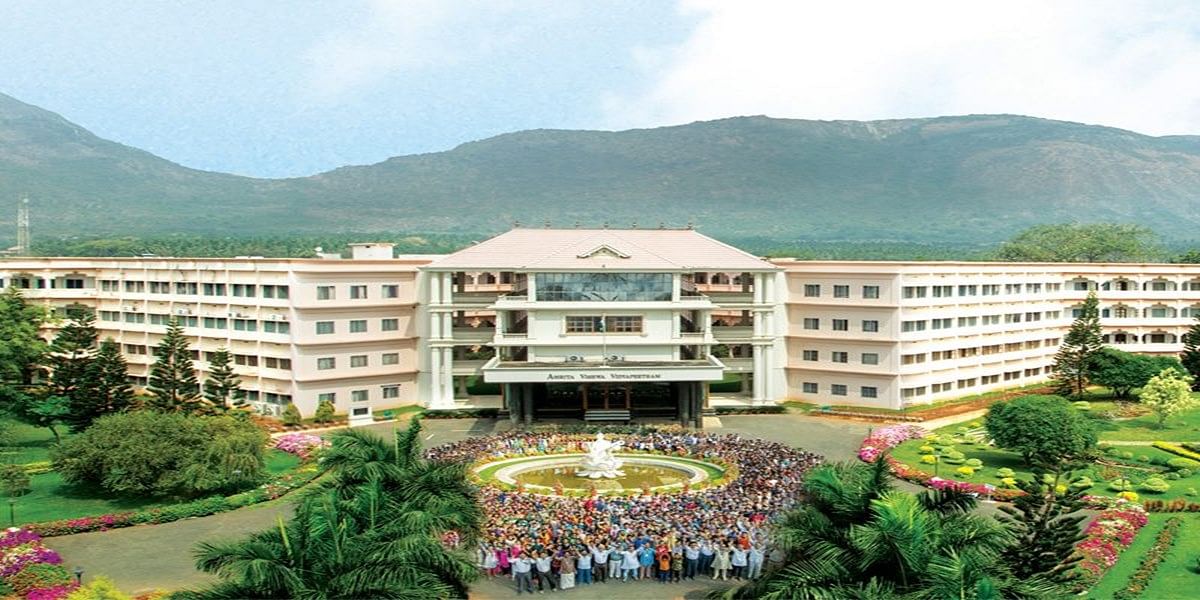BSc: Full Form, Course Details, Eligibility, Courses List, Fees, Duration

BSc or Bachelor of Science is a three-year course that deals with a variety of research-oriented studies of science under several streams and also focuses on the application of science concepts in real-life scenarios. BSc core subjects include mathematics, physics, chemistry, biology, computer science, etc.
BSc Admission 2024 requires students to have a minimum of 50% in their high school degree (10+2) with a science stream and qualify with the required cut-off marks in BSc entrance exams such as CUET-UG, NPAT, LPU NEST, etc.
The BSc course fees is between INR 1,500-4,40,000 per year, which varies according to location and college. The BSc Colleges in Bangalore have fees ranging between INR 50,000-3,00,000 per year, whereas, the colleges in Delhi have fees between INR 17,000-50,500 per year while the top Colleges in Hyderabad have fees ranging from INR 1,00,000-2,00,000 per year.
Table of Contents
- What is BSc Course?
- BSc Eligibility Criteria
- Why Choose a BSc Course?
- BSc Admission 2024
- BSc Entrance Exam
- BSc Specialization
- Bachelor of Science Lateral Entry
- Top BSc Colleges in India with Fee Details
- Types of BSc Courses
- Syllabus and Subjects for Bachelor of Science
- BTech vs BSc
- Bachelor of Science Salary in India
- Courses After BSc
- Career Options After BSc Graduation
- BSc Scholarship
- Skills to Excel as a BSc Graduate
BSc Course Details
| Degree | Bachelors |
| Full Form | Bachelor of Science |
| Duration | 3 Years |
| Age | No age limit |
| Minimum Percentage | 50% in 10+2 from a recognized board. |
| Average Fees | INR 1,500 to 4,40,000 per year. |
| Average Salary | INR 3–7 LPA |
| Employment Roles | Business Analyst, Scientist, Lecturer, Pharmacist, Plant Biochemist, etc. |
What is BSc Course?
BSc full form is Bachelor of Science. The course aims to develop a creative and critical understanding of a range of fields, including engineering, finance, and technology, as well as healthcare. The BSc course offers various specializations that students can select in their final years such as applied mathematics, information technology, chemistry, zoology, nursing, agriculture, etc.
The B.Sc job scope is vast, as a graduate can find employment opportunities in core science industries and other research-based industries. B.Sc graduates primarily work as Scientists, Research Scholars, Specialists, and R&D Industry Experts. The average BSc graduate salary in India is in the range of INR 3-7 LPA.
BSc Eligibility Criteria
BSc admission requires a candidate to fulfil a certain set of eligibility criteria such as education qualifications, subject requirements, entrance exam score, etc. Below are the BSc courses eligibility criteria:
- The candidate should have completed 10+2 examinations with Mathematics, Physics, Chemistry, and Biology with a minimum of 50% marks for general category and 45% marks for reserved category students. Students also need to clear entrance exams like NPAT, CUET-UG, LPU NEST, etc.
- The minimum age limit to enrol in the course is 17-18 years.
Why Choose a BSc Course?
BSc is one of the most prestigious undergraduate science degrees in India. The course offers extensive support for research-based study in various fields of science and technology. Below mentioned is a detailed insight regarding why to choose a BSc course:
- There is a substantial demand for skillful research scholars and analysts in several sectors that'll boost the country's technological development as the government has started to invest in research and development sectors in several domains.
- The graduate has the option of choosing career options in varied industries as per their interest ranging from healthcare, information technology, and finance to agriculture.
- The government of India has taken several initiatives to boost research and technical skill development such as "Digital India," and "Skill India" leading to an increase in demand for BSc graduates.
- In the last ten years, there has been an almost 30% increase in the number of students taking science, technology, engineering, and math (STEM) classes. (According to the report by AISHE).
- There is a continuous focus by the government to boost the demand for BSc graduates with decisions like spending 2% of its GDP on scientific research by 2024.
- Due to the emergence of new technologies like artificial intelligence, machine learning, and data science, there is a surge in demand for BSc course graduates.
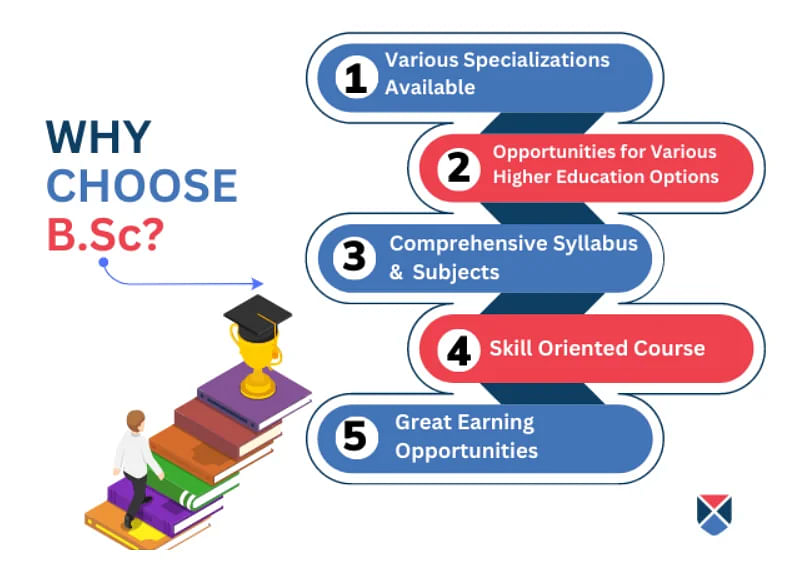
Read More: Advantages and Disadvantages of BSc Degree
BSc Admission 2024
BSc admission is done based on both merit basis in colleges like IES University and on the basis of entrance exam scores in colleges like LPU, BITS Pilani, etc. Listed below are the steps for the admission process for BSc courses in general:
- Step 1: Students need to clear the entrance exam cut-off as required by the college.
- Step 2: The student needs to complete the college application form both online and offline methods.
- Step 4: Further, the candidate is called for an interview or GD process after which a final merit list is published. The PI process is conducted in UPES for BSc courses.
- Step 5: Students need to provide valid documents for the document verification process after getting selected and paying the fees.
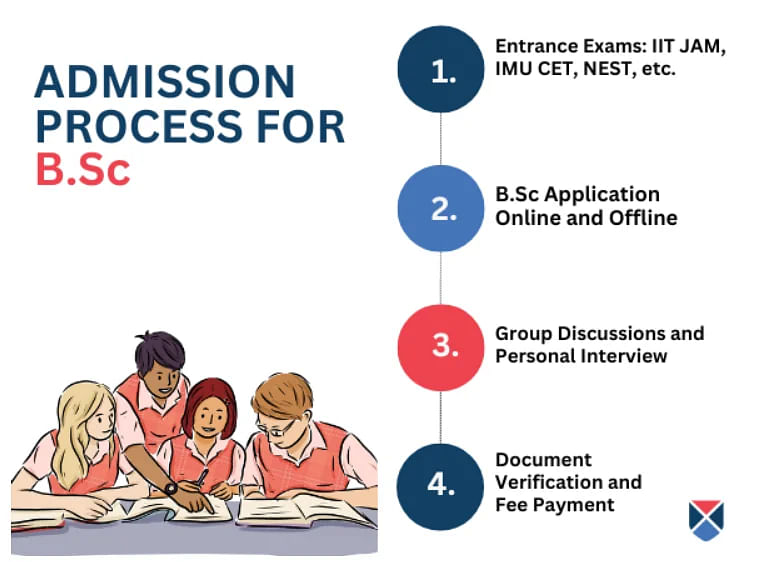
BSc Entrance Exam
The BSc entrance exam is conducted in the form of an online written test. There are several national and state-level entrance examinations affiliated with several universities. Apart from that, selected universities conduct a university-level exam for the admission process, apart from national-level examinations.
Some of the popular BSc entrance exams are listed below:
| BSc Entrance Exams | Registration Dates (Tentative) |
| CUET-UG | February 2024-April 2024 |
| NPAT | December 2023- May 2024 |
| CUCET | February 2024-April 2024 |
| TS EAMCET | March 2024- April 2024 |
| KCET | February 2024-April 2024 |
| Pune University OEE | April 2024 |
| WBJEE JENPAS | January 2024 |
BSc Specialization
There are several pure science and research technology applications, and each of them is pursued as a separate specialized domain. The diverse fields of research require specialized personnel to spearhead the research work and establish a concrete theorem.
Listed below are the top BSc branches or specializations in India:
- BSc Biotechnology
- BSc Nursing
- BSc Agriculture
- BSc Computer Science
- BSc Microbiology
- BSc Information Technology
- BSc Physics
Other BSc degree courses include:
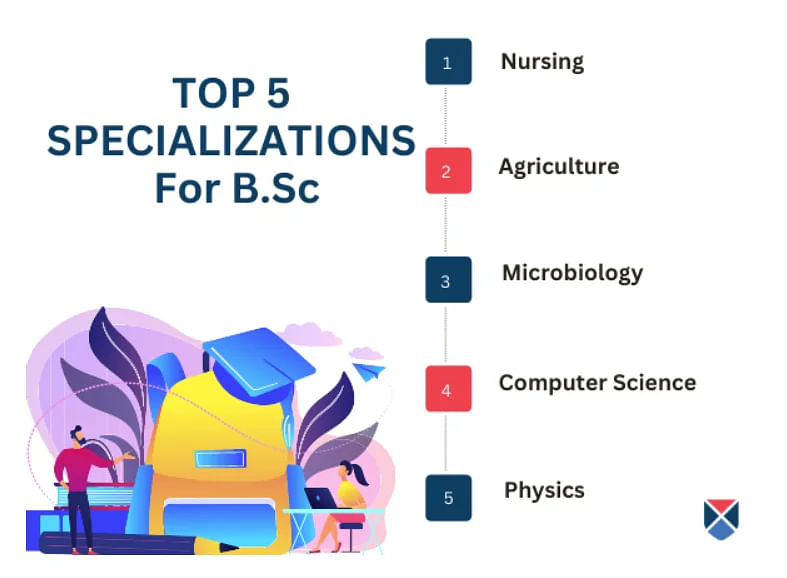
Read More: List of all BSc Specializations
Bachelor of Science Lateral Entry
The Bachelor of Science Lateral Entry course is designed for students who have completed a diploma in engineering or technology and wish to pursue a degree in science. BSc Lateral Entry admission is an entrance-based admission process. These entrance tests are known as LEET and are conducted by state-level education authorities every year.
B.Sc Lateral Entry Eligibility Criteria
B.Sc Lateral Entry eligibility criteria include that the aspirant must complete their diploma degree in science with a minimum of 45% aggregate. Candidates who fall into the reserved category will receive a 5% exemption.
Top BSc Colleges in India with Fee Details
The BSc courses in India are provided by top private colleges in India like UPES, Sharda University, LPU, whereas, the top government colleges like Mumbai University, IITs offer BSc degree in various specializations from chemistry to information technology. IITs offer BS degree also known as a bachelor of science degree in research and other related field with a 3-4 year of duration.
Below listed are the top colleges offering BSc along with the fee breakdown:
|
College Name |
B.Sc Tuition Fee Per Year | Admission Fees | Miscellaneous Fees Per Year |
| IIT Kanpur | INR 1,00,000 | INR 19,950 | INR 17,530 |
| UPES | INR 94,000 - 1,52,000 | INR 29,500 | INR 2,50,000 |
| Sharda University | INR 96,000 |
- |
INR 1,65,000 |
| Amity University | INR 84,000 - 4,40,000 | INR 20,000 | INR 1,05,000 - 1,83,000 |
| Siksha `O` Anusandhan | INR 1,00,000 - 1,80,000 | INR 10,000 | INR 95,000 - 1,65,000 |
| NMIMS | INR 3,50,000 |
INR 10,000 |
INR 1,80,000 |
| Indian Institute of Science | INR 10,000 | INR 15,000 (refundable) | INR 5,200 |
| BITS, Pilani | INR 1,78,000 |
INR 39,800 |
INR 25,000 |
| LPU | INR 1,00,000 - 2,40,000 | - | INR 9,000 |
| Bharati Vidyapeeth | INR 1,20,000 |
INR 10,000 |
- |
| JMI, Delhi | INR 7,800 | INR 5,000 | - |
| Silver Oak University | INR 42,000 |
INR 10,000 |
- |
| Assam Don Bosco University | INR 60,000 |
- |
INR 32,000 |
| VIT | INR 55,000 - 1,25,000 | INR 2,000 - 3,000 | - |
| Mumbai University | INR 16,940 | INR 380 | - |
| Indus University | INR 85,000 | - | INR 58,500 |
| Monark University | INR 74,000 | - | INR 4,500 |
Top City Wise BSc Colleges in India
Below listed are location-wise BSc colleges in India with the annual fees:
| Location | Tuition Fees Per Year |
| INR 10,000-1,50,000 | |
| INR 50,000-3,00,000 | |
| INR 10,000-2,00,000 | |
| INR 17,100-50,500 | |
| INR 12,000-1,56,000 | |
| INR 40,000-2,00,000 | |
| BSc Colleges in Hyderabad | INR 1,00,000-2,00,000 |
| INR 6,500-47,000 | |
| INR 10,750-85,500 | |
| INR 50,000-3,00,000 |
Read More: BSc Fees in India
Types of BSc Courses
In India, BSc courses are in high demand. A variety of courses are designed for students. Full-time BSc courses, integrated B.Sc courses, and distance BSc courses are among them. Listed below are the types of BSc courses details:
|
Type |
Basic Eligibility |
BSc Duration |
|
Full-Time BTech |
Should have passed 10+2 with PCM/PCB with a minimum of 50% marks for the general category and 45% for the reserved category + Entrance Exam Score |
3 Years |
|
Integrated BSc Course |
Should have passed 10+2 with PCM/PCB with a minimum of 50% marks for the general category and 45% for the reserved category |
5 Years |
|
Distance BSc Education |
Should have passed 10+2 with PCM/PCB with a minimum of 45-50% marks for the general category and 45-40% for the reserved category |
3-6 Years |
Distance BSc Admission Details
Distance BSc courses in India are recognized by UGC-DEB making them highly credible and valuable. Below mentioned are the distance BSc course details:
- Distance BSc fees in most of these colleges range from INR 13,000 to 20,000 per year.
- Admission to the current model of B.Sc is done directly, with almost no entrance examination.
- The colleges that offer distance BSc course are IMTS Institute, LPU, IGNOU, etc.
- There is no maximum age limit for taking admission to distance BSc courses.
Integrated BSc Admission Details
Distance BSc courses in India are recognized by UGC-DEB making them highly credible and valuable. Below mentioned are the distance BSc course details:
- Integrated B.Sc degrees are available with respect to the specialization chosen by students, such as engineering, biotechnology, etc.
- The integrated B.Sc fee ranges between INR 50,000-2,50,000 per year.
- The students can pursue integrated BSc courses from LPU, Chitkara University, Sharda University, etc.
- Students can pursue integrated BSc courses in combinations like BSc+MSc, BSc+B.Ed, BSc+ MBA, etc.
Read More: BSc+MSc
Syllabus and Subjects for Bachelor of Science
The BSc 1st year syllabus offers in-depth knowledge of a basic overview of the course and builds a strong foundation. The BSc second-year syllabus focuses on providing students with a deeper understanding of their chosen field of study through a combination of theoretical and practical coursework.
The BSc 3rd year syllabus focuses on attaining the practical experience required for the industry through projects and internships. Some of the subjects that are included in the BSc syllabus are:
| BSc Subjects | Topics Covered |
| Biology | Biology Basics, Genetics, Evolutionary Biology, Ecology, etc. |
| Chemistry | Inorganic Chemistry, Organic Chemistry, Physical Chemistry, Analytical Chemistry, etc. |
| Microbiology | Microbial Genetics, Virology, Immunology, Medical Microbiology, Microbial Ecology, etc. |
| Biotechnology | Cell Biology, Molecular Biology, Genetic Engineering, Bioprocess Engineering, etc. |
Read More: B.Sc Syllabus and Subjects
BTech vs BSc
BTech programs are more practical and application-oriented, with a strong emphasis on engineering and technology subjects. BSc is more theoretical and research-oriented. The table below showcases the differences between BA and BSc:
|
Course |
BTech |
BSc |
|
Full Form |
Bachelor of Technology |
Bachelor of Science |
|
Stream |
Science |
Science |
|
Course Overview |
The course syllabus cover topics like computer science, electrical engineering, mechanical engineering, civil engineering, etc. |
The course cover topics like physics, chemistry, biology, and mathematics. |
|
Course Duration |
4 Years |
3 years |
|
Eligibility |
High Degree (10+2) from a recognized Board with 60% in Physics, Chemistry, and Maths. |
50% in 10+2 from a recognized board |
|
Entrance Exams |
JEE Main, BITSAT, JEE Advanced, etc. |
NEST, NPAT, BHU UET, etc. |
|
Top Colleges |
NIT Jalandhar, LPU, IIT Bombay, IIT Delhi, etc. |
Miranda House, Presidency College, Wilson College, etc. |
|
Tuition Fees Per Year |
INR 55,000 - 4,90,000 |
INR 1,500- 4,40,000 |
|
Average Salary |
INR 2.5 - 6 LPA |
INR 3–7 LPA |
|
Job Roles |
IIT Madras, IIT Delhi, IIT Bombay, etc. |
Software Developer, Web Developer, Database Administrator, Network Administrator, etc. |
Read More: BSc vs B.Tech
| BE Vs BSc | BBA vs BSc |
| BSc vs BSc Hons | BA vs BSc |
Bachelor of Science Salary in India
The BSc salary in India on average is between INR 3-7 LPA [Sources: Ambition Box & Payscale]. Graduates after having three-plus years of experience can earn more than INR 7-8 LPA. Below listed are job roles for BSc graduates along with their average entry-level salaries:
|
BSc Jobs |
Entry Level Average Salary |
Salary After 3 Years of Experience |
| Medical Representative | INR 3.10 LPA | INR 4-5 LPA |
| Food Technologist | INR 3-4 LPA | INR 5-7 LPA |
| Technical Writer | INR 3-3.50 LPA | INR 4-6 LPA |
| GIS Specialist | INR 3-4.5 LPA | INR 5-8 LPA |
Read More: BSc Salary in India
Courses After BSc
BSc courses are diverse in nature and have scope both in India and abroad. Graduates who are willing to enhance their research further can opt for an M.Sc degree in India. BSc graduates, who have a knack for management studies, can opt for an MBA in any domain, which helps them gain interdisciplinary knowledge.
Some of the higher education courses include :
Read More: Courses After BSc
Career Options After BSc Graduation
There are plenty of job opportunities available for BSc graduates in both the public and private sectors. The job roles offered will differ according to the industry they work in, and the technical knowledge candidates possess. Below listed are top career positions for BSc graduates with top hiring companies and average salaries:
|
BSc Job Designations |
Hiring Companies |
Average Salary |
| Research Scientist | Lupin, Dr.Reddy's, Sun Pharmaceutical Industries, etc. | INR 5.30 LPA |
| Data Analyst | TCS, Cognizant, Wipro, Accenture, S&P Global, etc. | INR 5.70 LPA |
| Biotechnologist | RG Technosolutions, Dr. Lal Path Labs, Green Pro Biotech, SGS, etc. | INR 4 LPA |
| Lab Technician | SRL Diagnostics, Lab Tech, Apollo Hospitals, AIIMS, etc. | INR 3-4 LPA |
Top Recruiters for Bachelor of Science
The BSc scope is vast as graduates are hired by various industries such as healthcare and pharmaceuticals, biotechnology and life science, IT, oil and gas, education and research, etc. Below listed are a few top recruiters for graduates:
|
Top Recruiter |
Average BSc Entry-Level Salary |
| TCS | INR 3-4.50 LPA |
| ISRO | INR 4-6 LPA |
| HUL | INR 4.50-5 LPA |
| BARC | INR 3-5 LPA |
| Bayer Crop Science | INR 3.70-4.50 LPA |
[Sources: Payscale & Ambition Box]
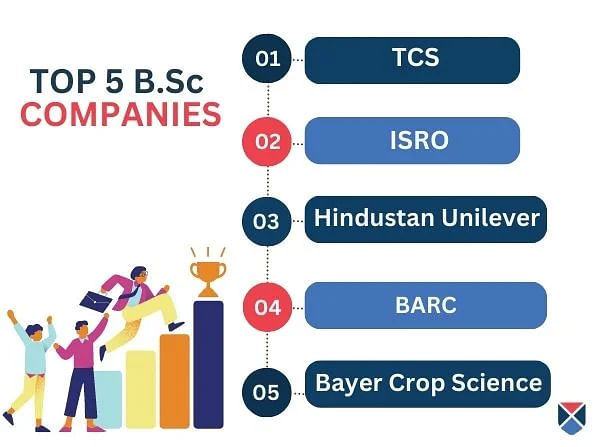
Read More: Career Options After BSc
BSc Scholarship
There are various government schemes, private initiatives, and individual college scholarships that students can get depending on their merit performance. Below mentioned are some BSc scholarships for graduates:
|
Scholarship |
Eligibility Criteria |
Amount |
| Post-Matric Scholarship for Students with Disabilities |
|
Upto INR 4,000 |
| POSE (Promotion of Science Education) Scholarship | The candidate should have secured 60% marks in 10+2 (High School Degree) and the candidate should not be more than 30 years. | Upto INR 22,000 |
|
HDFC Bank Parivartan’s ECS Scholarship |
|
Upto INR 75,000 |
|
Merck India Charitable Trust (MICT) scholarship |
|
Upto INR 35,000 |
Read More: BSc Scholarship
Skills to Excel as a BSc Graduate
BSc graduates are required to possess skills that will help them succeed in their professional careers. These skill sets will not only help them in terms of academics but will also help them to thrive as a working professional.
- Analytical Skills: Students with analytical skills are able to comprehend and utilize statistical techniques for testing hypotheses and interpreting data.
- Data Analysis Skills: BSc students should know how to evaluate numerical data, measurements, and observations, for data analysis skills.
- Scientific Writing Skills: The graduates working in research and academic areas should have scientific writing skills for research papers, reports, and articles.
- Technical Skills: The graduate should have knowledge of laboratory techniques, instrumentation skills, basic understanding of research methodologies and application of programming languages.
Top BSc [Bachelor of Science] Colleges
Top Science Entrance Exams
BSc Fee Structure
FAQs on BSc
Q: BSc or BBA which is better?
Q: What is BSc full form?
Q: Which are the best BSc courses?
Q: What scholarships are available for BSc 1st year students?
Q: What are the popular BSc courses after 12th?
Q: What is the future scope of BSc?
Q: What is B.Sc graduate average salary?
Q: Can I do B.Sc with PCB?
